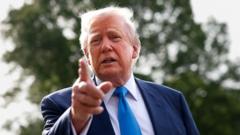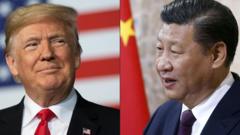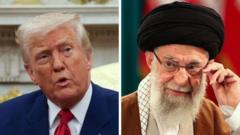Amidst the lively backdrop of Western Sydney's rodeo scene, citizens reflect on how global uncertainties, particularly Trump's unpredictable stance on trade, shape their electoral choices and national identity.
**Trump's Shadow Over the Australian Election: A Rodeo of Politics**

**Trump's Shadow Over the Australian Election: A Rodeo of Politics**
As Australia prepares for its federal election, the influence of Donald Trump's leadership looms large, complicating domestic political dynamics.
In Western Sydney, the atmosphere is charged with excitement as Stetson-clad Australians gather for a rodeo, reveling in fried snacks and thrilling exhibits of bull riding and barrel racing. Yet, the jovial air contrasts sharply with the political landscape ahead of Australia’s impending federal election, set for May 3. In the wake of global tensions—ranging from conflicts in Europe to Donald Trump's re-emergence and his penchant for tariffs—Australia's political climate resembles a wild rodeo, where candidates struggle to stay on course.
Rodeo enthusiast Guy Algozzino, donning cowboy attire, emphatically supports Trump, stating, “Tariffs are great. We should have had tariff protection many years ago.” In contrast, onlooker Jared Harris chooses a more detached approach: “It’s entertaining to watch,” he remarks about global politics, signifying a collective unease about the situation.
While Australia initially felt distanced from Trump’s politics, his second term manifests more unpredictably, causing ripples across international relationships. Tariffs aimed at both allies and adversaries have escalated. Prime Minister Anthony Albanese apprehensively criticized Trump’s tariff announcements, calling them “not the act of a friend,” while avoiding retaliation, reflecting the challenging balance Australia must maintain internationally.
As Australians gear up to cast their votes, primary issues—cost-of-living, healthcare, housing—are overshadowed by the implications of aligning with an unpredictable U.S. president. A recent poll suggests that Labor’s Albanese, who previously focused on domestic reforms, may see a surge in support with figures now reflecting a 54% preference against the Coalition's 47%.
The looming presence of Trump forces Australian politicians to confront their longstanding ties with the U.S., which have arguably been taken for granted. Australia’s reliance on U.S. military power in the Pacific, amid an assertive China, has never been more evident; Trump's recent comments reflect a lack of familiarity with key alliances like Aukus—the trilateral defense pact with the U.K. and the U.S.
Despite tensions surrounding Trump, David Andrews from the National Security College stresses Australia has “nowhere else to turn.” While only a minimal volume of Australian exports heads to the U.S., America's policies still heavily influence national discussions.
The political narrative grows complex as opposition leader Peter Dutton tries to present himself as in sync with Trump's policies while facing public skepticism. Critics this election cycle have turned to express a desire for a leader who will resist aligning too closely with Trump instead of one who fosters camaraderie.
Analysts suggest Trump's current unpredictable stance may inadvertently bolster Albanese's approval as the electorate seeks stability during uncertainty—echoing trends witnessed recently in Canada.
A prevailing sentiment, as articulated by key political figures, is to prepare for a more self-serving foreign policy stance moving forward—a shift away from collaborative approaches that have long defined Australia’s international relations.
Meanwhile, as the rodeo spectacle continues, the hopeful collective cheers mask the deeper tensions and anticipations weighing on Australian voters who look to their future leader to navigate these turbulent times.
Rodeo enthusiast Guy Algozzino, donning cowboy attire, emphatically supports Trump, stating, “Tariffs are great. We should have had tariff protection many years ago.” In contrast, onlooker Jared Harris chooses a more detached approach: “It’s entertaining to watch,” he remarks about global politics, signifying a collective unease about the situation.
While Australia initially felt distanced from Trump’s politics, his second term manifests more unpredictably, causing ripples across international relationships. Tariffs aimed at both allies and adversaries have escalated. Prime Minister Anthony Albanese apprehensively criticized Trump’s tariff announcements, calling them “not the act of a friend,” while avoiding retaliation, reflecting the challenging balance Australia must maintain internationally.
As Australians gear up to cast their votes, primary issues—cost-of-living, healthcare, housing—are overshadowed by the implications of aligning with an unpredictable U.S. president. A recent poll suggests that Labor’s Albanese, who previously focused on domestic reforms, may see a surge in support with figures now reflecting a 54% preference against the Coalition's 47%.
The looming presence of Trump forces Australian politicians to confront their longstanding ties with the U.S., which have arguably been taken for granted. Australia’s reliance on U.S. military power in the Pacific, amid an assertive China, has never been more evident; Trump's recent comments reflect a lack of familiarity with key alliances like Aukus—the trilateral defense pact with the U.K. and the U.S.
Despite tensions surrounding Trump, David Andrews from the National Security College stresses Australia has “nowhere else to turn.” While only a minimal volume of Australian exports heads to the U.S., America's policies still heavily influence national discussions.
The political narrative grows complex as opposition leader Peter Dutton tries to present himself as in sync with Trump's policies while facing public skepticism. Critics this election cycle have turned to express a desire for a leader who will resist aligning too closely with Trump instead of one who fosters camaraderie.
Analysts suggest Trump's current unpredictable stance may inadvertently bolster Albanese's approval as the electorate seeks stability during uncertainty—echoing trends witnessed recently in Canada.
A prevailing sentiment, as articulated by key political figures, is to prepare for a more self-serving foreign policy stance moving forward—a shift away from collaborative approaches that have long defined Australia’s international relations.
Meanwhile, as the rodeo spectacle continues, the hopeful collective cheers mask the deeper tensions and anticipations weighing on Australian voters who look to their future leader to navigate these turbulent times.



















